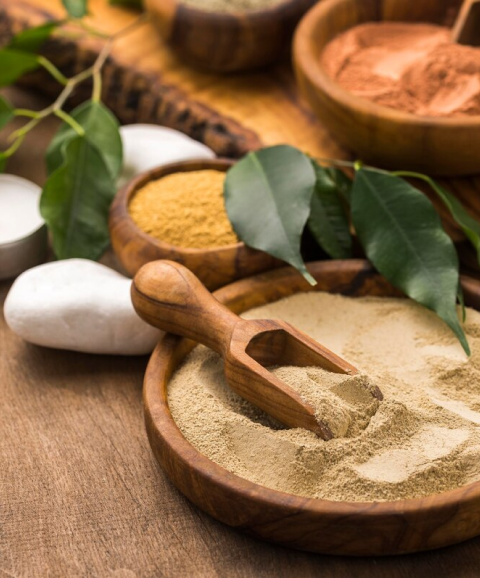
Introduction
In today's chaotic world, mental wellbeing is more important than ever. With the constant demands of work, social obligations, and the pressures of everyday life, finding inner peace can feel like an elusive goal. Many of us turn to quick fixes like stress-relief pills or distraction techniques, but these often only provide temporary relief. Ayurveda, the ancient system of holistic healing, offers a different approach—one that addresses the root causes of mental unrest and guides us towards lasting inner peace.
The Connection Between Mind and Body in Ayurveda

Understanding the Mind-Body Connection
Ayurveda teaches that the mind and body are deeply interconnected. A disturbance in one will inevitably affect the other. This philosophy forms the basis of Ayurvedic mental health practices, which seek to balance the body’s energies (or doshas) to foster mental clarity and emotional stability. By nurturing both the mind and body, Ayurveda helps create a state of holistic wellbeing where inner peace can naturally flourish.
The Role of Doshas in Mental Wellbeing
In Ayurveda, mental wellbeing is closely tied to the balance of the three doshas: Vata, Pitta, and Kapha. Each dosha governs different aspects of our physical and mental health. When these doshas are in balance, our mind is calm, clear, and focused. However, when they are out of balance, it can lead to mental disturbances such as anxiety, anger, or lethargy. Understanding your dosha and how it influences your mental state is key to achieving and maintaining inner peace.
Ayurvedic Practices for Mental Wellbeing

Daily Routines (Dinacharya) for a Balanced Mind
Dinacharya, or daily routine, is a cornerstone of Ayurvedic practice. By following a structured routine that aligns with natural rhythms, you can create a stable foundation for mental health. Simple practices like waking up early, practicing mindfulness, and eating at regular intervals help keep your doshas in balance and your mind at ease.
Meditation and Mindfulness
Meditation is a powerful tool in Ayurveda for calming the mind and fostering inner peace. Regular meditation helps to still the restless thoughts and reduces the impact of stress on your mental health. Ayurveda also emphasizes mindfulness—being present in the moment and fully engaged in whatever you are doing—as a way to cultivate mental clarity and emotional resilience.
Ayurvedic Diet for Mental Health
What you eat has a profound impact on your mental wellbeing. Ayurveda recommends a diet that is tailored to your dosha to maintain mental balance. For instance, those with a Vata imbalance may benefit from warm, grounding foods, while those with Pitta dominance might find cooling foods more soothing. Eating a balanced, dosha-appropriate diet not only nourishes the body but also supports a calm and stable mind.
Herbs and Remedies for Mental Wellbeing

Ashwagandha: The Stress-Busting Herb
Ashwagandha, one of the most revered herbs in Ayurveda, is known for its ability to reduce stress and anxiety. This adaptogen helps the body and mind adapt to stressors by regulating cortisol levels and promoting a sense of calm. Incorporating Ashwagandha into your routine can be a powerful way to enhance mental resilience and inner peace.
Brahmi: The Mind-Enhancing Herb
Brahmi, another key herb in Ayurveda, is prized for its ability to improve cognitive function and soothe the nervous system. It is often used to enhance memory, focus, and clarity of thought. Brahmi is particularly beneficial for those who experience mental fatigue or brain fog, helping to clear the mind and restore mental balance.
Sattvic Diet: Food for the Mind
In Ayurveda, a Sattvic diet is one that promotes mental clarity, calmness, and spiritual growth. Sattvic foods are fresh, pure, and nourishing—think fruits, vegetables, whole grains, and dairy. Avoiding overly processed, spicy, or heavy foods can help maintain a peaceful and balanced state of mind, making it easier to navigate life’s challenges with grace and composure.
Managing Stress and Emotions with Ayurveda

The Importance of Emotional Balance
Ayurveda recognizes that emotions have a direct impact on our mental and physical health. Unresolved emotions can lead to dosha imbalances, which in turn affect our mental state. Ayurveda offers various practices, such as Pranayama (breath control), to help manage and release negative emotions, thereby restoring emotional balance and promoting inner peace.
Yoga: The Physical and Mental Balancer
Yoga is an integral part of Ayurveda, offering physical postures (asanas) that not only strengthen the body but also calm the mind. Regular yoga practice helps to release physical tension, improve circulation, and balance the doshas, all of which contribute to mental clarity and emotional stability. Whether it’s a vigorous session to release pent-up energy or a gentle flow to relax the mind, yoga is a powerful tool for maintaining mental wellbeing.
Pranayama: Harnessing the Power of Breath
Pranayama, or breath control, is another essential Ayurvedic practice for mental health. Different Pranayama techniques can be used to calm the mind, reduce stress, and enhance focus. By controlling the breath, you can influence the flow of energy in the body, balance the doshas, and cultivate a state of inner peace.
Long-Term Benefits of Ayurveda for Mental Wellbeing

Sustainable Mental Health
Ayurveda doesn’t offer quick fixes; instead, it provides long-term solutions for mental wellbeing. By adopting Ayurvedic practices, you can cultivate a state of sustained mental health that goes beyond temporary stress relief. This holistic approach ensures that you are not just surviving but thriving, with a mind that is calm, clear, and resilient.
A Journey to Self-Awareness
Through Ayurveda, you embark on a journey of self-awareness and self-care. Understanding your dosha, recognizing the signs of imbalance, and knowing how to restore harmony empower you to take control of your mental health. This self-awareness is the foundation of lasting inner peace, enabling you to navigate life’s challenges with greater ease and grace.
Conclusion
Ayurveda offers a comprehensive approach to mental wellbeing that goes beyond mere symptom relief. By addressing the root causes of mental unrest and promoting balance in all aspects of life, Ayurveda helps you achieve and maintain a state of inner peace. Whether through daily routines, meditation, diet, or herbal remedies, Ayurveda provides the tools you need to nurture your mind, body, and spirit. In a world where mental health is often overlooked, choosing Ayurveda is a step towards a more balanced, peaceful, and fulfilling life.
Frequently Asked Questions about Ayurveda
Ayurveda focuses on balancing the doshas and treating the root causes of mental unrest, while modern approaches often focus on managing symptoms.
Yes, Ayurveda offers various practices, such as herbal remedies, meditation, and lifestyle changes, to effectively manage and reduce chronic stress and anxiety.
While a strict Ayurvedic diet can be beneficial, even small adjustments based on your dosha can significantly improve mental wellbeing.
Start with simple practices like regular meditation, a balanced diet, and following a daily routine (Dinacharya) that aligns with your dosha.
Ayurveda promotes sustainable mental health by addressing the root causes of mental imbalance, leading to lasting inner peace and resilience.






